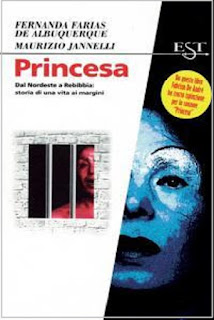Original title: "Princesa" (Princess) by Fernanda Farias de Albuquerque and Maurizio Jannelli. The was published in 1994 and republished in the Italian language in 1997.
According to Wikipedia, Fernanda Farias de Albuquerque (1963–2000), known as Princesa, was a Brazilian transgender woman. Born in the Brazilian countryside, she grew up without her father in a family with economic difficulties. At the age of seven, she is the victim of sexual abuse and later she leaves home. After a brief period as a kitchen assistant, she begins to prostitute herself in the big Brazilian cities, adopting the name of Guerra Princesa.
In 1988, after a brief stay in Spain, she moves to Italy. She begins to sell her body on the streets of Milan and becomes addicted to heroin. In 1990, she was arrested on charges of attempted murder of another call girl. In prison, she discovers that she has the AIDS virus.
In prison, she exchanges information with Giovanni Tamponi, a shepherd sentenced to life in prison, and he convinces her to write her story with the help of Maurizio Jannelli, also held in the same penitentiary. As a result, in 1994, 'Princessa' was published in Italian and translated into Portuguese, Spanish, German, and Greek.
In 1997, she was featured in the documentary Le Strade di Princesa (The Paths of Princess), a portrait of a very special transgender woman, by Stefano Consiglio. After being expelled and repatriated to Brazil, she committed suicide in 2000. In 2001, the film Princesa was produced, an international production directed by Henrique Goldman and based on the autobiographical book, with Ingrid de Souza, Cesare Bocci, Lulu Pecorari, and Mauro Pirovano.
In Genoa, in 2009, the organization 'Princessa' supporting the rights of transsexuals was born. In the same city, on July 16, 2010, Don Andrea Gallo suggested that a square be named after the Brazilian, but the proposal was not accepted.
Available via Amazon
and Wikipedia


















Post a Comment